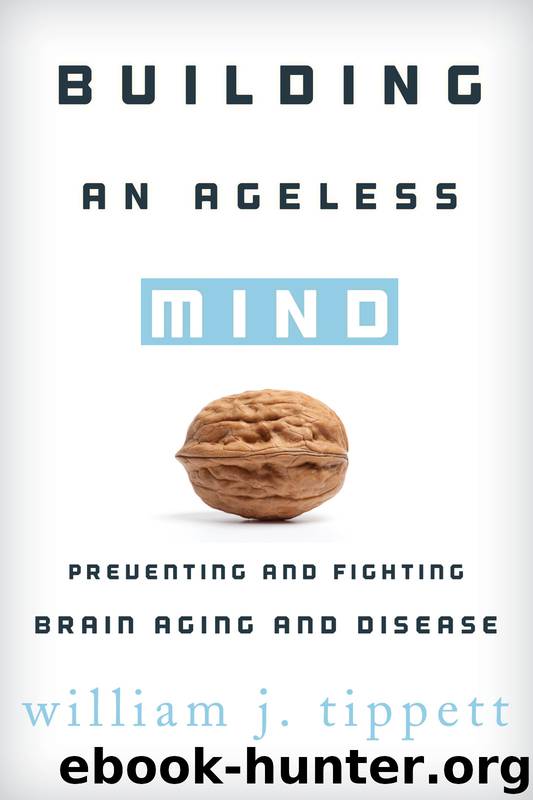Building an Ageless Mind by William J. Tippett

Author:William J. Tippett [Tippett, William J.]
Language: eng
Format: epub
Tags: undefined
Publisher: Rowman & Littlefield Publishers
Published: 2012-02-25T05:00:00+00:00
Chapter 9
What Is Mild Cognitive Impairment?
After reading this chapter, you should be able to answer the following questions:
If I have MCI, will I get AD?
What are the two subtypes of MCI?
What areas of my brain are affected?
How do I know if I have MCI?
Mild cognitive impairment (MCI) is a condition that can affect an individual’s memory retrieval, visuospatial performance, and language and attention skills below the expected normal performance for that individual’s given ability, but without significantly interfering with everyday functioning. Two subtypes of MCI have been identified: amnestic (predominately affecting memory) and nonamnestic (not significantly affecting memory).
MCI often becomes a concern as a result of self-realization, in that individuals begin to believe that their normal ability is somewhat impaired. These individuals normally have good insight and a good understanding of their abilities and are usually the first to say something does not seem right. They often report to primary-care centers with complaints that their performance is below what they expect of themselves. These are complaints related to one aspect of their life only (e.g., memory or language) and not two or more. Two or more areas of concern would move these individuals into a category involving a dementia diagnosis. Thus, the hallmark of MCI is that it is a deficit in one area of functioning and not several, unlike, for example, Alzheimer’s disease, where two or more areas of concern would be needed for a diagnosis.
As noted above, there are currently two subtypes for this illness. Amnestic MCI refers to the fact that the individual is having a problem strictly relating to an aspect of memory, but no other deficits outside of this concern are noted. With nonamnestic MCI, concerns are related to a cognitive area not relying on memory, such as attention, language-finding ability, or visually guided movements. Remember, these concerns must be out of the ordinary and must be significantly impacting one’s ability to perform at a normal, everyday level. This does not mean, for instance, that if you forgot where you placed your car keys twice last week, you must have a mild cognitive impairment. It is important to remember that it has to significantly affect your everyday functioning and, based on your “normal” functioning, seem very out of the ordinary, to the extent that you notice it impacting your life. An example might be forgetting where you placed your keys four times a week for the last few weeks, and noticing that they turn up in the freezer or microwave oven. If you never forgot your keys before and this is impacting your ability to perform everyday activities, then this could be a concern and you need to be evaluated for MCI or another illness. Please keep in mind that I have offered this example just as a guideline of a type of behavior that might fall into the realm of MCI or possible dementia.
We as humans personalize information in an effort to understand it and to make sense of it. Thus, when receiving a diagnosis of, for instance, MCI, we do not often ask what pathologically is going on in my brain.
Download
This site does not store any files on its server. We only index and link to content provided by other sites. Please contact the content providers to delete copyright contents if any and email us, we'll remove relevant links or contents immediately.
Should I Stay or Should I Go? by Ramani Durvasula(7667)
Why We Sleep: Unlocking the Power of Sleep and Dreams by Matthew Walker(6725)
Fear by Osho(4740)
Flow by Mihaly Csikszentmihalyi(4697)
Rising Strong by Brene Brown(4459)
Why We Sleep by Matthew Walker(4447)
The Hacking of the American Mind by Robert H. Lustig(4383)
How to Change Your Mind by Michael Pollan(4357)
Too Much and Not the Mood by Durga Chew-Bose(4348)
Lost Connections by Johann Hari(4188)
He's Just Not That Into You by Greg Behrendt & Liz Tuccillo(3900)
Evolve Your Brain by Joe Dispenza(3679)
The Courage to Be Disliked by Ichiro Kishimi & Fumitake Koga(3504)
Crazy Is My Superpower by A.J. Mendez Brooks(3400)
In Cold Blood by Truman Capote(3386)
Resisting Happiness by Matthew Kelly(3341)
What If This Were Enough? by Heather Havrilesky(3311)
The Book of Human Emotions by Tiffany Watt Smith(3309)
Descartes' Error by Antonio Damasio(3279)
